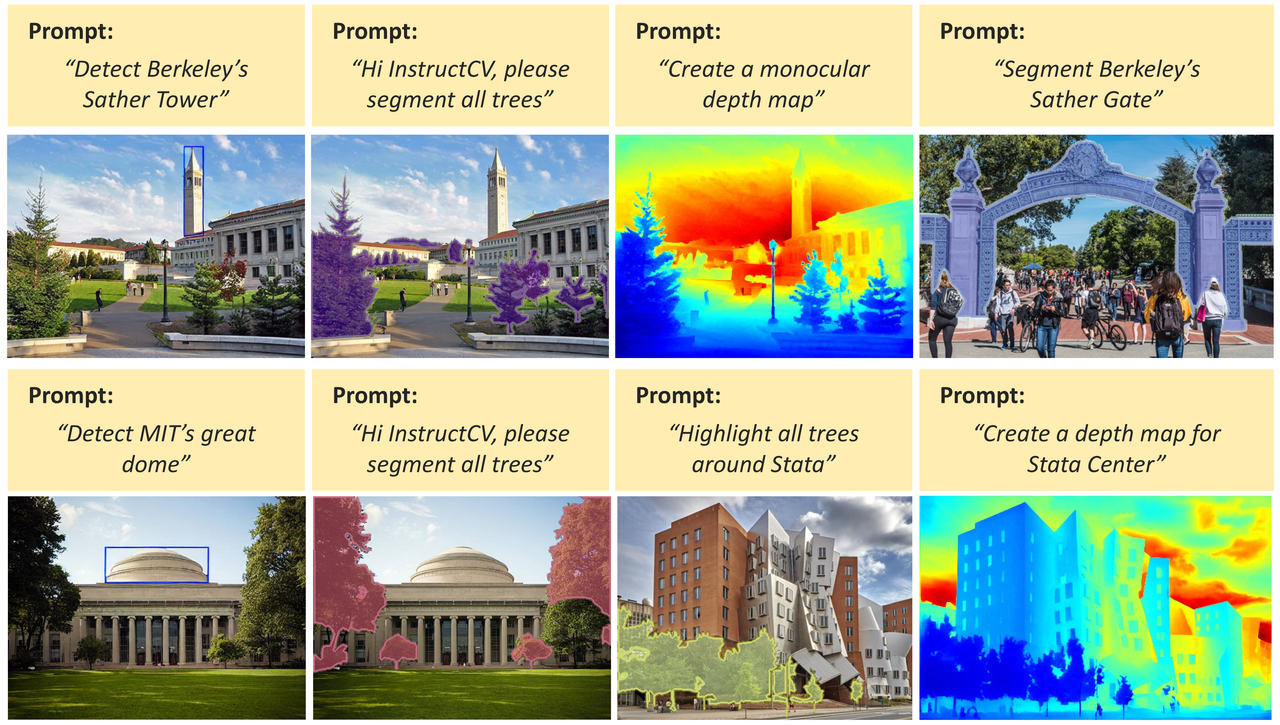# ------------------------------------------------------------------------------
# Copyright (c) 2023, Alaa lab, UC Berkeley. All rights reserved.
#
# Written by Yulu Gan.
# ------------------------------------------------------------------------------
from __future__ import annotations
import math
import cv2
import random
from fnmatch import fnmatch
import numpy as np
import gradio as gr
import torch
from PIL import Image, ImageOps
from diffusers import StableDiffusionInstructPix2PixPipeline
title = "InstructCV: Instruction-Tuned Text-to-Image Diffusion Models as Vision Generalists"
description = """
Yulu Gan, Sungwoo Park, Alex Schubert, Anthony Philippakis, Ahmed Alaa
arXiv | Code
We develop a unified language interface for computer vision tasks that abstracts away task-specific design choices and enables task execution by following natural language instructions. \n\n
Tips for using this demo: Please upload a new image and provide an instruction outlining the specific vision task you wish InstructCV to perform (e.g., “Segment the dog”, “Detect the dog”, “Estimate the depth map of this image”, etc.). \n
""" # noqa
example_instructions = [
"Please help me detect Buzz.",
"Please help me detect Woody's face.",
"Create a monocular depth map.",
]
model_id = "alaa-lab/InstructCV"
def main():
# pipe = StableDiffusionInstructPix2PixPipeline.from_pretrained(model_id, torch_dtype=torch.float16, safety_checker=None).to("cpu")
pipe = StableDiffusionInstructPix2PixPipeline.from_pretrained(model_id, torch_dtype=torch.float16, safety_checker=None).to("cuda")
example_image = Image.open("imgs/example2.jpg").convert("RGB")
def load_example(
seed: int,
randomize_seed: bool,
text_cfg_scale: float,
image_cfg_scale: float,
):
example_instruction = random.choice(example_instructions)
return [example_image, example_instruction] + generate(
example_image,
example_instruction,
seed,
0,
text_cfg_scale,
image_cfg_scale,
)
def generate(
input_image: Image.Image,
instruction: str,
seed: int,
randomize_seed:bool,
text_cfg_scale: float,
image_cfg_scale: float,
):
seed = random.randint(0, 100000) if randomize_seed else seed
text_cfg_scale = text_cfg_scale
image_cfg_scale = image_cfg_scale
width, height = input_image.size
factor = 512 / max(width, height)
factor = math.ceil(min(width, height) * factor / 64) * 64 / min(width, height)
width = int((width * factor) // 64) * 64
height = int((height * factor) // 64) * 64
input_image = ImageOps.fit(input_image, (width, height), method=Image.Resampling.LANCZOS)
if instruction == "":
return [input_image]
generator = torch.manual_seed(seed)
edited_image = pipe(
instruction, image=input_image,
guidance_scale=text_cfg_scale, image_guidance_scale=image_cfg_scale,
num_inference_steps=25, generator=generator,
).images[0]
instruction_ = instruction.lower()
if fnmatch(instruction_, "*segment*") or fnmatch(instruction_, "*split*") or fnmatch(instruction_, "*divide*"):
input_image = cv2.cvtColor(np.array(input_image), cv2.COLOR_RGB2BGR) #numpy.ndarray
edited_image = cv2.cvtColor(np.array(edited_image), cv2.COLOR_RGB2GRAY)
ret, thresh = cv2.threshold(edited_image, 127, 255, cv2.THRESH_BINARY)
img2 = input_image.copy()
seed_seg = np.random.randint(0,10000)
np.random.seed(seed_seg)
colors = np.random.randint(0,255,(3))
colors2 = np.random.randint(0,255,(3))
contours,_ = cv2.findContours(thresh,cv2.RETR_LIST,cv2.CHAIN_APPROX_NONE)
edited_image = cv2.drawContours(input_image,contours,-1,(int(colors[0]),int(colors[1]),int(colors[2])),3)
for j in range(len(contours)):
edited_image_2 = cv2.fillPoly(img2, [contours[j]], (int(colors2[0]),int(colors2[1]),int(colors2[2])))
img_merge = cv2.addWeighted(edited_image, 0.5,edited_image_2, 0.5, 0)
edited_image = Image.fromarray(cv2.cvtColor(img_merge, cv2.COLOR_BGR2RGB))
if fnmatch(instruction_, "*depth*"):
edited_image = cv2.cvtColor(np.array(edited_image), cv2.COLOR_RGB2GRAY)
n_min = np.min(edited_image)
n_max = np.max(edited_image)
edited_image = (edited_image-n_min)/(n_max-n_min+1e-8)
edited_image = (255*edited_image).astype(np.uint8)
edited_image = cv2.applyColorMap(edited_image, cv2.COLORMAP_JET)
edited_image = Image.fromarray(cv2.cvtColor(edited_image, cv2.COLOR_BGR2RGB))
# text_cfg_scale = 7.5
# image_cfg_scale = 1.5
return [seed, text_cfg_scale, image_cfg_scale, edited_image]
with gr.Blocks() as demo:
# gr.HTML("""
# InstructCV: Towards Universal Text-to-Image Vision Generalists
#
""")
gr.Markdown("" + title + "
")
gr.Markdown(description)
with gr.Row():
with gr.Column(scale=1.5, min_width=100):
generate_button = gr.Button("Generate result")
with gr.Column(scale=1.5, min_width=100):
load_button = gr.Button("Load example")
with gr.Column(scale=3):
instruction = gr.Textbox(lines=1, label="Instruction", interactive=True)
with gr.Row():
input_image = gr.Image(label="Input Image", type="pil", interactive=True)
edited_image = gr.Image(label=f"Output Image", type="pil", interactive=False)
input_image.style(height=512, width=512)
edited_image.style(height=512, width=512)
with gr.Row():
randomize_seed = gr.Radio(
["Fix Seed", "Randomize Seed"],
value="Randomize Seed",
type="index",
show_label=False,
interactive=True,
)
seed = gr.Number(value=90, precision=0, label="Seed", interactive=True)
text_cfg_scale = gr.Number(value=7.5, label=f"Text weight", interactive=True)
image_cfg_scale = gr.Number(value=1.5, label=f"Image weight", interactive=True)
# gr.Markdown(Intro_text)
load_button.click(
fn=load_example,
inputs=[
seed,
randomize_seed,
text_cfg_scale,
image_cfg_scale,
],
outputs=[input_image, instruction, seed, text_cfg_scale, image_cfg_scale, edited_image],
)
generate_button.click(
fn=generate,
inputs=[
input_image,
instruction,
seed,
randomize_seed,
text_cfg_scale,
image_cfg_scale,
],
outputs=[seed, text_cfg_scale, image_cfg_scale, edited_image],
)
demo.queue(concurrency_count=1)
demo.launch(share=False)
if __name__ == "__main__":
main()

